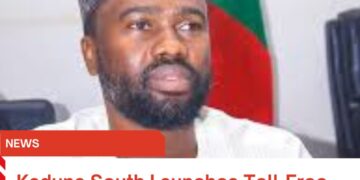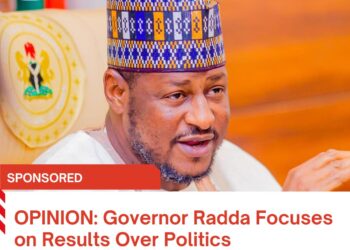By: Abdulazeez Alhassan
Nigerians are at the mercy of wicked people who are too selfish and demonic. Our hearts are melted in financial crimes and corruption. Collectively, we ought to be worried and concerned about the future of our younger ones. Thus, one should applaud the anti-graft agency; EFCC in its fight against financial crimes in Nigeria.
The Economic and Financial Crimes Commission, which was established in 2003, during the reign of former President Olusegun Obasanjo, is one of the top anti-graft agencies in Nigeria. It focuses on the investigation of different financial crimes, coupled with the responsibility of enforcing laws that have to do with money laundering, fraudulent banking, miscellaneous offenses, advance fee fraud, and other criminal acts that are financial and economic in nature. They strive to put an end to any act that breaks the Penal and Criminal Codes. However, financial crimes and corruption still prevail in Nigeria, since the creation of the agency to date. Although, the agency has recorded tremendous successes in its operations by securing a total of 865 convictions in 2020 and 2,220 convictions in 2021, Yet, crime and corruption are like tentacles which entangle almost all of our lives.
The agency was first headed by Nuhu Ribadu while Abdulrasheed Bawa is its current chairman. However, it will surprise you to hear that most of the past heads of the agency were either sacked or suspended due to financial crimes, corruption or insubordination. This is disheartening and embarrassing to Nigeria and Nigerians at large.
Nuhu Ribadu, being the first chairman of the agency was accused by his successor, Farida Waziri. She described him as a “double faced man , who lacks principles“. She added, “Nuhu Ribadu enjoyed the wealth of people he once described as corrupt”. Although, these are mere claims and accusations, one needs to critically investigate the genesis of the accusations.
Conversely, Farida was also investigated by The Independent Corrupt Practices and Other Related Offences Commission( ICPC) in several petitions written against her involvement in alleged corrupt practices while in office.
Sad again, Wazir’s successor, Ibrahim Lamorde was also charged by the senate committee for the diversions of $5b recovered in the agency during his tenure.
This is not all, as the immediate past head of the agency, Ibrahim Magu, was also suspended due to some allegations charged against him by the Attorney General of the Federation and Minister of Justice, Abubakar Malami(SAN). Magu was charged for allegations bordering on alleged sale of seized assets to cronies, associates and friends, alleged delay in acting on two vessels seized by the navy, alleged favouring of some investigators called Magu boys, among others. Owing to the above allegations, Magu was replaced by Bawa on 16 February, 2021. But could we say that the agency is efficiently and effectively working as is required?, Perhaps Bawa is trying considering the suspects he convicted on allegations related to financial crimes; efforts that superseded those of his predecessor.
Despite its numerous achievements so far, there are certain loopholes and setbacks in the mode of the agency’s operations that need reformation and should be thoroughly addressed. Firstly, the impression that crime pays in Nigeria is a prominent challenge to the agency. Nigeria is awash with examples where the consequences of corruption pale in comparison to its benefits.
For example, in January 2013, an Assistant Director of the Nigerian Pension Commission charged for stealing ₦32 billion ended up with a ₦250,000 fine. Similarly, we can recall the presidential pardon by the former President then – Jonathan which absolved the former Bayelsa State Governor in 2013. Perhaps the most disturbing events in this trend are the rapturous welcomes given to those the EFCC successfully prosecutes and convicts – from a one-time PDP chieftain to a former Chairman of the Nigerian Ports Authority.
Also, the Presume of Innocence in Nigerian 1999 Constitution (amended) is also a setback to the EFCC. The article which is in section 36, sub-section 5 stated “Every person who is charged with a criminal offence shall be presumed to be innocent untill proven guilty”, is a simplistic provision which perhaps may breed crime and guide not just Criminal Trials but Quasi Criminal Trials in Common Law Jurisdictions.
Similarly, Nigeria’s political establishment is not helping matters, as it has shown its willingness to embrace public figures tainted with corruption. It appears immaterial when there are question marks on the integrity of individuals because the elite turns a blind eye and individuals are welcomed with open arms in Nigeria. For instance, the presidential pardon granted to the likes of Jolly Nyame and Joshua Dariye clearly depicts that this administration is dimwit in its fight against crime and corruption. These were set of people who were charged with different crimes, who are supposed to be in prison for several years, but are pardoned. Femi Falana (SAN) has this to say “This pardon creates the impression that the state protects the rich and that the poor in Nigeria has nothing to regret more than his powerlessness and lack of connections. He added, A Nigerian was jailed for stealing noodles in Abuja, he was not granted state pardon. If you want to pardon your friends, you must extend that pardon to other people in the spirit of equity and fairness”. Additionally, FG shuned from investigating some ministers of President Muhammadu Buhari, who purchased APC presidential form at the rate of 100 million each. Sadly, the state minister of education is inclusive, while students are at home for almost 3 months.
One will be surprised to hear that despite the transition of the EFCC’s administration from Magu to Bawa, the agency is still engulfed by financial crimes and corruption.
Daily Trust Newspaper on Monday, September 20, 2010, reported that Mukhtar Lukman defrauded VASCUMI INVESTMENT NIGERIA LIMITED. Mukhtar, one of the Directors of the Company, was reported to EFCC for Fraud, Forgery, Theft, Criminal Diversion and Criminal Breach of Trust.
I, personally made an investigative research and found out that the defrauded company is a property development company known as Transproject-Vascumi Housing Estate, which developed about 10 hectares of land, located at Wumba District in Abuja.The accused defrauded the company to the tune of over N1 billion since 2010 when the case was first reported to EFCC and till date, which is 12yrs after, the case has not been determined. The company has been bankrupt since then with the ineffectiveness of EFCC in handling the matter.
Reports have it that the accused is presently living freely despite all the evidence against him. In addition, the case has been handled by not less than five prosecuting teams of the EFCC, yet nothing is done by the agency. Infact, the identified properties acquired by the accused have not been forfeitured as required by the EFCC act, thus giving room to the accused to freely sell them.
More so, the structure of the EFCC makes it answerable to the Presidency. Important issues, ranging from the Agency’s budget to the chairman’s job security, are subject to Senate and Presidential approval. Admittedly, this is not an anomaly because even the independence of the FBI is questionable. Nonetheless, the United States government attempts to draw lines between the FBI’s accountability and its need for independence. This line is non-existent in the EFCC.
Take, for instance, the run-up to the 2007 presidential elections when the EFCC presented a list of 135 “corrupt” candidates it said should not run for office. The list was discredited as an attempt to hurt the political adversaries of the then-president. More recently, the present administration has blatantly refused to release public figures facing trial even though their bail applications have long been met. In short, successive Nigerian governments have made political interference the order of the day.
Also, the Judiciary contributes to the ineffectiveness of the agency, as they sometimes make a mockery of the anti-corruption drive. A notable case is that of the former Rivers State Governor, Peter Odili, who obtained a “perpetual Injunction” which barred the EFCC from “arresting, detaining or arraigning” him.
In conclusion, The Federal Government, particularly the President should avoid political interference in EFCC. In addition, the Attorney General’s power to interfere in Anti-Corruption cases should also be checked. The Attorney General shouldn’t have a say in Anti-Corruption cases.
The EFCC should also avoid publicising their mission to arrest some suspects noting that publicising such effort is like giving the suspect a signal to avoid arrest. These happened severally and suspects escape arrest. For example, when EFCC picked up the Access Bank Managing Director over allegations on money laundering, the suspect was never charged; a situation only the EFCC can better explain. Though this tactics generate headlines, but should not be seen as a success if in the end, the suspects walk freely.
Similarly, EFCC should be assiduously checked through ICPC or another agency that may not really be a sister organisation like the ICPC. That can really help in checkmating the agency (EFCC). That all staff of the agency should publicly declare their assets, as this will go along way in determining whether they are involved in financial crimes and corruption or not.
The Nigerian Financial Intelligence Unit (NFIU) should be submitting a quarterly report to the senate, which should be carefully monitored by the President.
Considering the nefarious activities of some of our leaders, the greediness and selfishness of Nigerians, the article of “Presume of Innocence” should also be carefully amended.
Also, the judiciary should take cases of financial crimes and corruption with utmost seriousness and should stop delaying cases. They should note that they will be questioned on how they discharge their duties on the day of resurrection.
Abdulazeez Alhassan writes from Kaduna and can be reached via axeexx67@gmail.com.





































